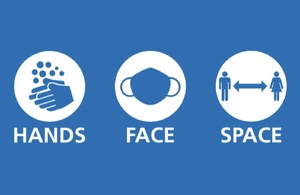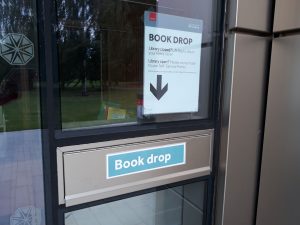The Library continues to remain open for bookable study space and for Click & Collect for those of you here on campus.
Following the announcement of the national lockdown earlier this month, and the risk of increased transmissibility by the new strain of COVID-19, we’ve been reviewing current health and safety control measures.
We’ve updated our face covering guidance which includes a change about how they should be used in the Library. You’re now expected to wear a face covering (unless you are exempt) throughout the duration of your visit, even when sat at your assigned desk.

Remember hands, face, space to keep all Library members and staff safe
This is the only change we’ve made to our current safety measures in the Library so the rest of our previously published guidance remains the same.
The Library is designated as a ‘common area’ along with other spaces on campus as there is a relatively high number of different people using the space each day.
During the Autumn Term and the start of this year some people, understandably, were forgetting to replace their face covering when moving around the building. Due to this, and as the current transmissibility of the virus is heightened, this additional safety measure will help minimise the risk for all Library users and staff.
Please comply with the new guidance and the existing measures to help us keep you and our staff safe so that we can continue to provide effective library services through this time. Our staff have been working throughout the pandemic to provide a vital service to support you. Please show them the respect they deserve and comply with their instructions – they are there for your safety.
Breaches of our guidelines are being taken very seriously, and may result in fines and/or expulsion from Halls and/or the University, in accordance with our University disciplinary procedures
We will, of course, keep our policy under review and adjust it as necessary in the coming weeks and months, in line with the wider situation.
See our Current Library Services guide and the Library website for further information about all the services available to you on campus and online.
Your Library team





 Apologies for the technical problems we were experiencing with the study space bookings system this morning.
Apologies for the technical problems we were experiencing with the study space bookings system this morning.
 If you are planning your Masters dissertation, or you are heading into your final year this Autumn and your thoughts are starting to turn to topics for your dissertation, you might be interested to take a look at our
If you are planning your Masters dissertation, or you are heading into your final year this Autumn and your thoughts are starting to turn to topics for your dissertation, you might be interested to take a look at our  It’s February which means if you’re a final year student, you’re probably frantically trying to complete your dissertation. Over the past few weeks, the
It’s February which means if you’re a final year student, you’re probably frantically trying to complete your dissertation. Over the past few weeks, the 
 Working from home? Need guidance on accessing the material you need for your dissertation? Then sign up for one of our sessions run by your Academic Liaison Librarians.
Working from home? Need guidance on accessing the material you need for your dissertation? Then sign up for one of our sessions run by your Academic Liaison Librarians.
 If you find that your eyes feel tired, you feel headachy, struggle to concentrate or have neck and back pain, one possible explanation could be screen fatigue, say our
If you find that your eyes feel tired, you feel headachy, struggle to concentrate or have neck and back pain, one possible explanation could be screen fatigue, say our